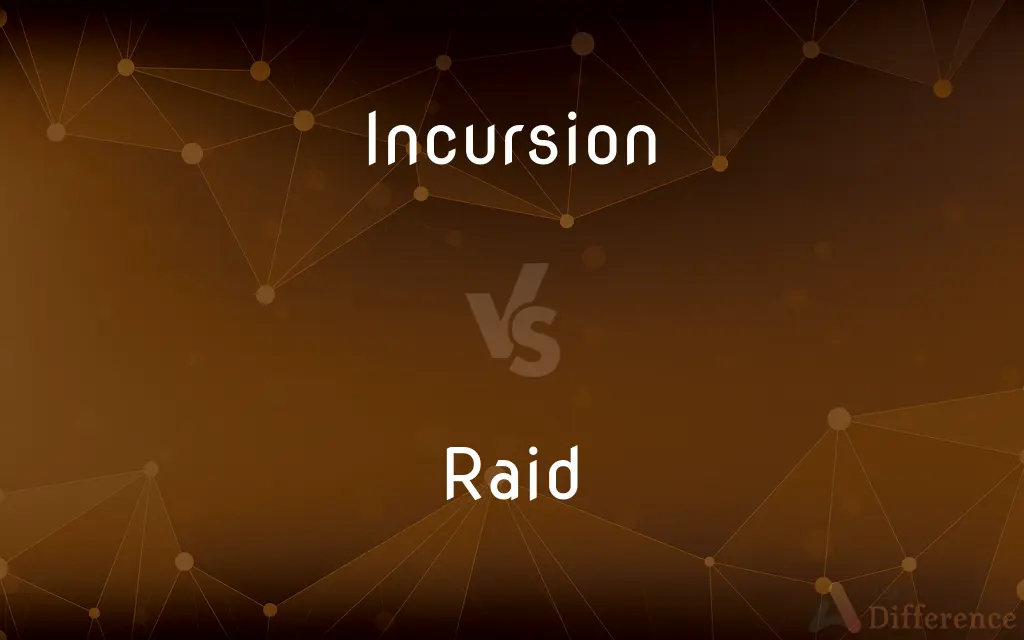Incursion vs. Raid — What's the Difference?
Edited by Tayyaba Rehman — By Maham Liaqat — Updated on March 24, 2024
Incursions involve a sudden entry into enemy territory, primarily for quick, specific goals; raids are sudden attacks, often for plunder or disruption, usually brief and fast.

Difference Between Incursion and Raid
Table of Contents
ADVERTISEMENT
Key Differences
Incursions are strategic military operations that entail entering enemy territory briefly, often to gather intelligence or test defenses, emphasizing the element of penetration into hostile areas. On the other hand, raids are aggressive, swift attacks aimed at causing damage or seizing assets, focusing more on the surprise and speed of the attack rather than the depth of entry.
While incursions are planned with the intention of minimal engagement, focusing on objectives such as reconnaissance or specific strikes against strategic targets, raids aim for quick, tangible gains like capturing goods or disrupting enemy operations. This means incursions may avoid direct combat to achieve their goals, whereas raids often engage the enemy directly but for a limited time.
Incursions typically involve military forces and are part of broader military campaigns or strategies, underlining their strategic nature. In contrast, raids can be conducted by military units, pirates, or even police forces in law enforcement scenarios, illustrating their varied applications beyond traditional warfare.
The scale and preparation of incursions often imply a higher level of organization and a strategic objective, suggesting a state or formal entity's backing. Raids, by contrast, might be executed by smaller, less formally organized groups with immediate goals, such as guerrilla fighters or bandits.
Despite these differences, both incursions and raids are characterized by their suddenness and the element of surprise, which are crucial to their execution and success. However, their intentions, targets, and often the scale distinguish them significantly in military and strategic contexts.
ADVERTISEMENT
Comparison Chart
Objective
To gather intelligence, test defenses, or carry out specific missions.
To cause damage, disrupt, or seize assets.
Engagement
Minimal, avoids direct combat when possible.
Direct, often engaging with the enemy.
Actors
Military forces, part of broader military strategies.
Military units, pirates, police forces, guerrilla fighters, bandits.
Organization
High level of organization and strategic planning.
Can be less formally organized, with immediate and tangible goals.
Scale and Scope
Larger scale, strategic in nature, focusing on penetration of enemy lines.
Smaller scale, focused on quick gains, less about territorial penetration.
Compare with Definitions
Incursion
A brief invasion or attack without the intention of long-term occupation.
The incursion into the disputed area was meant to test the enemy's defenses.
Raid
An attempt to steal or seize something quickly.
Pirates conducted a raid to capture valuable cargo.
Incursion
An intrusion into a place or sphere of activity.
The software company viewed the competitor's new product as an incursion into its market.
Raid
A sudden attack on an enemy by troops, aircraft, or other armed forces.
The commandos launched a raid to free hostages.
Incursion
A foray into uncharted or enemy areas for reconnaissance.
The special forces conducted an incursion to map enemy positions.
Raid
A police operation aiming to arrest suspects or seize evidence.
The police conducted a raid on the suspect's house at dawn.
Incursion
A sudden entry into enemy territory for strategic purposes.
The military planned an incursion to gather crucial intelligence.
Raid
A swift, surprise attack for plunder or disruption.
The raid on the village resulted in the theft of livestock.
Incursion
A penetration into hostile territory for a specific mission.
The incursion aimed to destroy the radar installation.
Raid
An aggressive entry into an area with the intent to damage or steal.
The guerrilla group's raid disrupted the supply lines.
Incursion
Incursion is a science fiction roleplaying game created by Richard Tucholka and published by Tri Tac Games in 1992.
Raid
A surprise attack by a small armed force.
Incursion
An invasion or attack, especially a sudden or brief one
Their successful incursion into the electronic-media market
Border incursions
Incursions into enemy territory
Raid
A sudden forcible entry into a place by police
A raid on a gambling den.
Incursion
An aggressive entrance into foreign territory; a raid or invasion.
Raid
An entrance into another's territory for the purpose of seizing goods or valuables.
Incursion
The act of entering another's territory or domain.
Raid
A predatory operation mounted against a competitor, especially an attempt to lure away the personnel or membership of a competing organization.
Incursion
The act of entering or running into
Homes damaged by the incursion of floodwater.
Raid
An attempt to seize control of a company, as by acquiring a majority of its stock.
Incursion
An aggressive movement into somewhere; an invasion.
Raid
An attempt by speculators to drive stock prices down by coordinated selling.
Incursion
A running into; hence, an entering into a territory with hostile intention; a temporary invasion; a predatory or harassing inroad; a raid.
The Scythian, whose incursions wildHave wasted Sogdiana.
The incursions of the Goths disordered the affairs of the Roman Empire.
Raid
To make a raid on.
Incursion
Attack; occurrence.
Sins of daily incursion.
Raid
To conduct a raid or participate in one.
Incursion
The act of entering some territory or domain (often in large numbers);
The incursion of television into the American livingroom
Raid
(military) A quick hostile or predatory incursion or invasion in a battle.
Incursion
An attack that penetrates into enemy territory
Raid
An attack or invasion for the purpose of making arrests, seizing property, or plundering.
A police raid of a narcotics factory
A raid of contractors on the public treasury
Incursion
The mistake of incurring liability or blame
Raid
(sports) An attacking movement.
Raid
(Internet) An activity initiated at or towards the end of a live broadcast by the broadcaster that sends its viewers to a different broadcast, primarily intended to boost the viewership of the receiving broadcaster. This is frequently accompanied by a message in the form of a hashtag that is posted in the broadcast's chat by the viewers.
Raid
(online gaming) A large group in a massively multiplayer online game, consisting of multiple parties who team up to defeat a powerful enemy.
Raid
(transitive) To engage in a raid against.
The police raided the gambling den.
The soldiers raided the village and burned it down.
A group of mobsters raided an art museum and stole a bunch of paintings.
Raid
(transitive) To lure from another; to entice away from.
Raid
(transitive) To indulge oneself by taking from.
I raided the fridge for snacks.
Raid
A hostile or predatory incursion; an inroad or incursion of mounted men; a sudden and rapid invasion by a cavalry force; a foray.
Marauding chief! his sole delightThe moonlight raid, the morning fight.
There are permanent conquests, temporary occupations, and occasional raids.
Raid
An attack or invasion for the purpose of making arrests, seizing property, or plundering; as, a raid of the police upon a gambling house; a raid of contractors on the public treasury.
Raid
To make a raid upon or into; as, two regiments raided the border counties.
Raid
A sudden short attack
Raid
An attempt by speculators to defraud investors
Raid
Search without warning, make a sudden surprise attack on;
The police raided the crack house
Raid
Enter someone else's territory and take spoils;
The pirates raided the coastal villages regularly
Raid
Take over (a company) by buying a controlling interest of its stock;
T. Boone Pickens raided many large companies
Raid
Search for something needed or desired;
Our babysitter raided our refrigerator
Common Curiosities
What is an incursion?
An incursion is a sudden entry into enemy territory, typically for strategic purposes like reconnaissance or a specific mission, without intending long-term occupation.
Are incursions always military operations?
Primarily, yes, incursions are military operations aiming at gathering intelligence or carrying out specific missions within enemy lines.
How do incursions differ from raids?
Incursions focus on entering enemy territory for specific strategic goals with minimal engagement, while raids aim for quick, tangible gains through direct attacks.
Can raids be part of legal operations?
Yes, raids can be conducted by law enforcement as part of legal operations to arrest suspects or seize evidence.
What is a raid?
A raid is a swift, surprise attack aimed at causing damage, disrupting operations, or seizing assets, often characterized by quick entry and exit.
Do incursions involve combat?
Incursions may involve combat but typically aim to minimize direct engagement, focusing on strategic objectives.
Who performs raids?
Raids can be performed by military units, pirates, guerrilla fighters, police forces, and bandits, among others.
What preparation is needed for an incursion?
Incursions require significant planning, including intelligence gathering, logistical support, and contingency planning.
Is international law applicable to incursions and raids?
Yes, international law, including the laws of war and national sovereignty principles, applies to how and when incursions and raids can be conducted.
What objectives do raids have?
Raids aim to disrupt, cause damage, or seize assets from the enemy, often through surprise and swift action.
What is the purpose of an incursion?
The purpose of an incursion is to penetrate enemy territory for strategic objectives such as reconnaissance, testing defenses, or targeted strikes.
Can civilians be targets of raids?
In law enforcement scenarios, raids can target civilian locations suspected of illegal activities, but military raids usually target enemy combatants or resources.
How do raids impact enemy operations?
Raids can significantly disrupt enemy operations, cause material losses, or demoralize the enemy through sudden and unexpected attacks.
Are raids always successful?
Success depends on planning, execution, and the element of surprise; not all raids achieve their intended outcomes.
What distinguishes a raid from a full-scale invasion?
A raid is a quick, targeted attack intended for specific objectives without seeking to hold territory, unlike a full-scale invasion which aims at occupation.
Share Your Discovery

Previous Comparison
Siam vs. Thailand
Next Comparison
Hybrid vs. VarietyAuthor Spotlight
Written by
Maham LiaqatEdited by
Tayyaba RehmanTayyaba Rehman is a distinguished writer, currently serving as a primary contributor to askdifference.com. As a researcher in semantics and etymology, Tayyaba's passion for the complexity of languages and their distinctions has found a perfect home on the platform. Tayyaba delves into the intricacies of language, distinguishing between commonly confused words and phrases, thereby providing clarity for readers worldwide.
















































